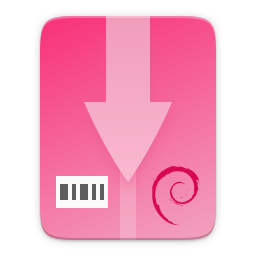
deb-get
apt-get functionality for .debs published in 3rd party repositories or via direct download. It works on Ubuntu and derivative distributions.
Made with 💝 for ![]()
Introduction
deb-get makes it easy to install and update .debs published in 3rd party
apt repositories or made available via direct download on websites or GitHub
release pages.
Install
Use deb-get to install deb-get.
sudo apt install curl
curl -sL https://raw.githubusercontent.com/wimpysworld/deb-get/main/deb-get | sudo -E bash -s install deb-getAlternatively, you can download the .deb of deb-get from the releases page
and install it manually.
Usage
Here's an example of how to install Google Chrome.
deb-get install google-chrome-stableYou can see what applications are supported by using deb-get list or you
can search the available applications with deb-get search <app>.
You can upgrade packages installed using deb-get by running
deb-get upgrade.
deb-get {update | upgrade | show pkg | install pkg | reinstall pkg | remove pkg
| purge pkg | search pkg | cache | clean | list | prettylist | help | version}
deb-get provides a high-level commandline interface for the package management
system to easily install and update packages published in 3rd party apt
repositories or via direct download.
update
update is used to resynchronize the package index files from their sources.
upgrade
upgrade is used to install the newest versions of all packages currently installed on the system.
install
install is followed by one package desired for installation or upgrading.
reinstall
reinstall is followed by one package desired for reinstallation.
remove
remove is identical to install except that packages are removed instead of installed.
purge
purge is identical to remove except that packages are removed and purged (any configuration files are deleted too).
clean
clean clears out the local repository (/var/cache/deb-get) of retrieved package files.
search
search for the given regex(7) term(s) from the list of available packages supported by deb-get and display matches.
show
show information about the given package including its install source and update mechanism.
list
list the packages available via deb-get.
prettylist
markdown formatted list the packages available via deb-get. Use this to update README.md
cache
list the contents of the deb-get cache (/var/cache/deb-get)
help
show this help
version
show deb-get version
Why?
3rd party apt repositories exist. They are not going away.
Some application vendors and projects express their support for Debian/Ubuntu
by publishing .debs of their software as direct downloads or via
their own apt repositories. deb-get makes it easy to find, install and update
.debs published in this way.
- Perhaps you want to use software that is not (yet) officially packaged for Debian/Ubuntu.
- Perhaps you want to use software that is fast moving and newer versions are available from the vendor/project.
- Perhaps you want to use some non-free software that Debian/Ubuntu cannot distribute due to licensing restrictions.
deb-get tries to remedy this by providing a curated index of software
available for Ubuntu that is published by the project or vendor. deb-get is
inspired by Software Boutique, a graphical application I co-authored that does
much the same thing and has been included in Ubuntu MATE
since 2015.
Supported Software
The software below can be installed, updated and removed using deb-get.
deb-get install <packagename>deb-get updatedeb-get upgradedeb-get remove <packagename>deb-get purge <packagename>
Legend
The icons above denote how deb-get installs/updates the packages.
How do package updates work?
3rd party apt repositories and PPAs
If packages are available via a 3rd party apt repository
![]() or a Launchpad PPA
or a Launchpad PPA
![]() , then those packages
will be updated/upgraded when using
, then those packages
will be updated/upgraded when using apt-get update and apt-get upgrade.
GitHub Releases and direct downloads
For .deb packages that are only available via GitHub Releases
![]() or direct download
or direct download
![]() , then those packages
can only be updated/upgrade by using
, then those packages
can only be updated/upgrade by using deb-get update and deb-get upgrade.
Adding Software
Create a function in deb-get that is named deb_the-package-name where
"the-package-name" is the Package: name shown using apt show. The deb_
prefix is required so deb-get can dynamically build the list of available
software.
Take a look at the existing deb_ functions as reference for adding new
packages to deb-get.
What is acceptable?
This defines what software that can be added to deb-get and therefore the
scope of the project in terms if what it is intended for.
- Software has to be published as a
.deb. Build from source, tarballs or other binaries releases will not be accepted. - Software has to be published authoritatively by the upstream vendor, project or maintainer. Packages published by unassociated community contributors will not be accepted.
- Software must be actively maintained.
- Only stable/production releases. Daily/nightly, betas or pre-release versions will not be accepted.
- GitHub Releases and direct downloads must have a reliable means to dynamically determine the current upstream published version. Hardcoded versions will be not accepted.
- Packages from the official Debian or Ubuntu apt archives will not be accepted.
Related projects
- App Outlet: A Universal linux app store
- pacstall: The AUR alternative for Ubuntu
- Ubuntu Make: Easy setup of common tools for developers on Ubuntu.
- unsnap: Quickly migrate from using snap packages to flatpaks
- makedeb: A simplicity-focused packaging tool for Debian archives
In the media
- The deb-get tool helps Ubuntu (and derivative distro) fans grab extra apps - GamingOnLinux
- Deb-Get is ‘Apt-Get’ for 3rd-Party Ubuntu Software - omg! ubuntu!
- How To Install Third-Party Linux Applications with Deb-Get - toms HARDWARE
- How to use deb-get to install third-party software on Ubuntu - TechRepublic
- Ubuntu MATE’s Lead Creates a Nifty Tool to Help Install 3rd Party Deb Packages - It's FOSS
- deb-get, an "apt-get" to install third-party software on Ubuntu - ubunlog
- deb-get, a utility for installing third-party software - Linux Addicted